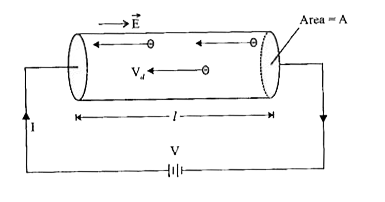Define drift velocity of electrons and deriver its relation with electric current .
It is the average velocity with which the free electrons gets drifted towards the positive end of the conductor under the influence of an external electric field applied .
Consider a conductor of length L and uniform cross -sectional area A. Let V be the applied potential difference across the ends of the coductor .The magnitude of electric field set up across the conductor is given by
E=VL

Let n be the number density of free electron .
i.e ., n=No. of free electronsvolume of the conductor
n=No. of free electronsAL
∴ No .of free electrons = nAL
If e is the magnitude of charge on each electron , then total charge in the conductor , Q = ne
Q=(nAL)e
The time taken by the charge to cross the conductor length is given by t=LVd . where Vd is drift velocity of electrons .
According to the definition of electric current ,
cancelLI=Qt
I=nALeL/Vd
I+(nAcancelLe)/(cancelL)V_(d)
which is the requried relationship between electric current and drift velocity .
Since n,e and A are constants , ∴I∝Vd
Also Vd=eEτm
Hence eq . (2) can be written as
I=neA(eEτm)
I=ne2AEτm
Similar Questions
Derive the expression for drift velocity of free electron in terms of relaxation time and electric field applied across a conductor.
View SolutionDerive the expression for drift velocity of free electron in terms of relaxation time and electric field applied across a conductor.
View SolutionDerive the expression from drift velocity of free electron in terms of relaxation time and electric field applied across a conductor.
View SolutionDerive the expression for drift velocity of free electron in terms of relaxation time and electric field applied across a conductor.
View SolutionDefine drift velocity of free electron . If relaxation time is r then write a vector relation b etween drift velocity and electric field.
View SolutionDefine drift velocity of free electron . If relaxation time is r then write a vector relation b etween drift velocity and electric field.
View Solution(i) Derive an expression for drift velocity of free electrons.
(ii) How many drift velocity of electrons in a metallic conductor vary with increase in temperature ? Explain.
View SolutionDerive an expression for drift velocity of free electrons in a conductor in terms of relaxation time.
View SolutionExplain the term 'drift velocity' of electrons in a conductor. Hence obtain the expression for the current through a conductor in terms of 'drift velocity'.
View SolutionDefine relaxation time of the free electrons drifting in a conductor. How is it related to the drift velocity of free electrons ? Use this relation to deduce the expression for the electrical resistivity of the material.
View Solution
